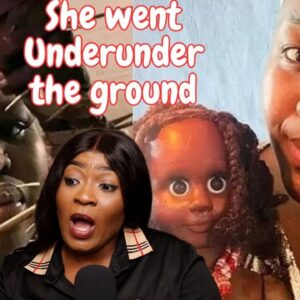In a world where faith is a cornerstone for many, the rise of questionable religious leaders and institutions has become a growing concern. Recently, a prophet has come forward to deliver an impassioned warning, urging believers to abandon what she calls “false churches.” Her statements have sparked intense debate within communities of faith, shining a light on the dangers of spiritual exploitation and manipulation.
The Prophet’s Bold Message
The prophet, identified as Zisa, hailing from South Africa, describes herself as a servant of God, baptized, and filled with the Holy Spirit. She claims to have been commissioned in 2023 to expose false teachings and guide believers toward salvation. Speaking candidly on social media platforms, Zisa lists numerous churches and prominent leaders whom she accuses of betraying the gospel of Christ.

Among the names mentioned are churches with significant followings across Africa, including Action Chapel, Endless Hope Bible Church, and Revelation Glory Ministries. Zisa warns that these institutions are not only misleading their congregations but are also under divine judgment. She emphasizes that those who continue to associate with these churches risk being caught in the consequences of their leaders’ actions.
The Judgment of God
Zisa explains that the judgment awaiting these so-called false churches is severe. Drawing from biblical references, she describes how their leaders will face divine retribution, including illness, incapacitation, and even death. She cites Ezekiel 34 as a foundation for her claims, asserting that corrupt shepherds who exploit their flocks will face God’s wrath.
Her call to action is clear: believers must distance themselves from these churches if they wish to avoid being ensnared in their leaders’ fate. “If you want to see the Lord and His rest, leave now,” she implores.
A Plea for Deliverance
Beyond condemnation, Zisa also offers prayers for those trapped in these institutions. She asks God to “lead the captivity captives” and release the congregants from the control of what she describes as “goats and foxes” who have corrupted the gospel. Her prayer also calls for the punishment of those who exploit and harm vulnerable individuals within these churches, invoking imagery of millstones tied to their necks as judgment.
Reactions from the Faithful
The prophet’s declarations have stirred significant reactions. Some praise her courage for speaking out against powerful figures, while others question her motives and the validity of her claims. One commentator, known as Dolphin, shared her reflections on the matter, admitting her own conflicted feelings about a particular pastor’s family.
Dolphin expressed admiration for the wife of Bishop Maku, a leader mentioned in Zisa’s warnings. She noted the anointing and spiritual presence evident in the wife’s sermons, lamenting how such revelations now taint her perception. “One thing about the anointed,” Dolphin remarked, “is that they end up disappointing us.”
While Dolphin ultimately decided to withdraw her support for the pastor and his wife, she extended compassion to congregants caught in these institutions. She highlighted how many followers are drawn to such churches during moments of vulnerability, seeking solace from illness, depression, or other hardships.
The Challenges of Leaving
Leaving a church, especially one with strong community ties, is no simple task. Dolphin pointed out that many members of these organizations are deeply brainwashed and manipulated. According to her, these individuals are not fully in control of their decisions, as they are subjected to spiritual and psychological influences designed to bind them to the church.
For those seeking to escape, Dolphin advises prayer as a vital tool for deliverance. She encourages believers to ask God for strength and guidance, asserting that divine intervention can create pathways for them to leave. In some cases, she suggests, the leaders themselves may eject members who resist their control, further enabling their departure.
A Broader Reflection on Faith
This unfolding story invites broader reflection on the role of organized religion in society. While faith can serve as a source of strength and community, it can also become a tool for exploitation when wielded by unscrupulous leaders. Zisa’s warnings and Dolphin’s commentary reveal the complexities of navigating spiritual relationships in an era where trust in institutions is increasingly fragile.
The tension between personal faith and institutional loyalty is evident in Dolphin’s struggle to reconcile her admiration for Bishop Maku’s wife with the prophet’s accusations. Her decision to withdraw underscores the difficulty of disentangling spiritual inspiration from institutional flaws.
Final Thoughts
The prophet’s message, though controversial, serves as a call for vigilance within faith communities. It reminds believers to prioritize their relationship with God over blind allegiance to institutions or charismatic leaders. Zisa’s uncompromising stance challenges individuals to examine the authenticity of their spiritual practices and the integrity of those they follow.
As debates continue, one thing remains clear: the pursuit of faith must be guided by discernment, compassion, and a commitment to truth. For those caught in the web of manipulative religious practices, the path to freedom may be arduous, but it is a journey worth undertaking to reclaim their spiritual autonomy.
In the end, the message of this saga is not one of condemnation but of hope — a reminder that the essence of faith lies not in buildings or titles but in the personal connection to the divine.
News
Kelly Khumalo and Arthur Mafokate ‘wedding’: It was new music all along
When images of Arthur Mafokate and Kelly Khumalo started trending on social media a few weeks ago, rumours about a possible romance and a possible marriage between the two musicians spread like wildfire. It was all purely speculative, as no…
‘Mampintsha was never broke’: Babes Wodumo clears the air on lobola claims
‘I can confirm that, as the Simelanes, we received lobola from Mandla and not from Showmax or PAP,’ Babes Wodumo’s manager said. Babes Wodumo and the late Mampintsha. Images: Instagram @viraltrends Award-winning Gqom queen Babes Wodumo has downplayed allegations made…
29-Year-Old Black Entrepreneur Wants to Buy Spirit Airlines to Make it America’s First Black-Owned Commercial Airline
29-year-old entrepreneur Hashim Walters from New Orleans, Louisiana, has officially launched The Latimer Group, an ownership consortium focused on acquiring Spirit Airlines, an iconic brand facing critical financial distress. He says that his mission is to empower African American economic…
What Gogo Maweni Just Did Is So Heart Breaking
The Escalating Drama Between Scoten and Goa: A Deep Dive into a Social Media War In the world of social media, the line between entertainment and personal conflicts often becomes blurred. This is evident in the ongoing drama between two…
SHOCKING 😯 MPUMELELO MSELEKU SHOT AND KIL#ED SOMEONE…||ALLEGEDLY .
The Latest Update on the Controversy Involving Somizi and Mohale In the world of entertainment, the drama surrounding the relationship between Somizi Mhlongo and Mohale Motaung has become one of the most talked-about topics. This couple has consistently been in…
Strange Things About Somizi And Mohale That No One Talks About
Strange Things About Somizi and Mohale’s Relationship That People Never Talk About In the world of South African celebrity gossip, one relationship that has sparked both admiration and speculation is that of Somizi Mhlongo and Mohale Motaung. The two have…
End of content
No more pages to load











